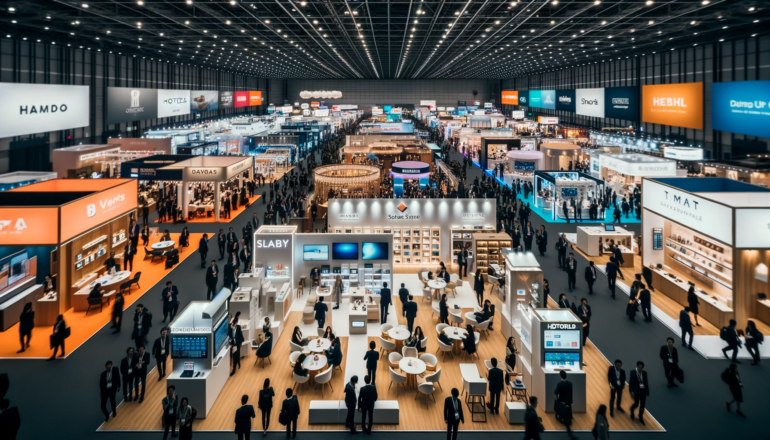Virtual reality (VR) has become a game-changer in the way we experience events, offering a level of immersion that was previously unimaginable. In the UK, where the events industry is both vibrant and diverse, the incorporation of VR technology has opened up new avenues for creativity, engagement, and memorable experiences. Renting VR equipment has become an increasingly popular option for event organizers looking to add a unique twist to their gatherings. This article will explore some top events in the UK where renting VR equipment truly makes a difference, providing an innovative edge that captivates audiences.
Corporate Conferences and Trade Shows

Corporate conferences and trade shows are some of the most significant events where the impact of VR technology can be most clearly seen. These events often involve large crowds, multiple exhibitors, and a need to stand out in a competitive environment. This is where vr events come into play, offering exhibitors a powerful tool to attract and engage potential clients.
For instance, a company showcasing its latest products can use VR to create immersive product demonstrations, allowing attendees to experience the product in a virtual environment. This approach not only draws people to the booth but also leaves a lasting impression. According to a study by EventMB, 74% of event planners believe that VR increases attendee engagement, making it a worthwhile investment for companies aiming to make an impact.
Trade shows are also ideal for virtual tours, especially for industries like real estate, tourism, and architecture. Instead of just talking about a property or destination, companies can transport attendees to these locations virtually. This immersive experience can be much more effective in convincing potential buyers or clients, as it provides a tangible sense of the product or service being offered.
Music Festivals and Concerts
Music festivals and concerts have long been about creating unforgettable experiences for attendees. With the introduction of VR technology, these experiences have reached new heights. At some of the UK’s biggest music festivals, such as Glastonbury and Reading Festival, VR has been used to enhance the audience’s experience, allowing them to interact with the music and performances in innovative ways.
One popular application is the creation of virtual stages or backstage tours. Fans who may not have the best view of the stage can don a VR headset and experience the concert from the front row or even go backstage to see what happens behind the scenes. This not only enhances the experience for those attending the event in person but also opens up new possibilities for remote attendees who can participate in the festival from the comfort of their own homes.
The inclusion of VR at music festivals has proven to be a hit with younger audiences, who are often looking for tech-savvy ways to enjoy their favorite events. This trend is likely to continue as more festival organizers see the benefits of offering VR experiences as part of their events.
Educational Workshops and Seminars

In the educational sector, workshops and seminars are essential for professional development and knowledge sharing. However, these events can sometimes struggle to keep participants engaged, especially when the content is dense or highly technical. This is where VR can make a significant difference, transforming traditional learning experiences into interactive and immersive sessions.
For example, in medical workshops, participants can use VR to simulate surgeries or other complex procedures, providing a hands-on experience that is both educational and engaging. This approach not only helps in retaining knowledge but also builds confidence as participants can practice in a risk-free environment.
Similarly, in engineering or architectural seminars, VR can be used to create 3D models that attendees can interact with, allowing them to better understand the subject matter. This hands-on approach can be particularly beneficial for visual learners who might struggle with traditional lecture formats.
The use of VR in educational settings has been shown to increase knowledge retention by up to 75%, according to a report by PwC. This makes VR an invaluable tool for educational events, helping participants to fully grasp and retain complex information.
Sports Events and Fan Experiences
Sports events are all about the thrill of the game, and VR is now taking that excitement to a whole new level. In the UK, where football, rugby, and cricket are followed with passionate fervor, VR is enhancing the fan experience in ways that were previously unimaginable.
At football matches, for instance, VR can be used to offer fans a 360-degree view of the action, even if they are sitting far from the pitch. This technology allows fans to experience the game as if they were sitting in the best seats in the stadium, adding a new dimension to their enjoyment. Additionally, VR can be used to create virtual training sessions, where fans can step into the shoes of their favorite players and experience the game from their perspective.
Rugby and cricket matches have also seen the integration of VR technology, particularly in fan zones, where supporters can engage in virtual experiences related to the sport. These “vr events” not only enhance the live experience but also offer something unique for fans to enjoy before or after the game, making the entire event more immersive and memorable.
Charity Events and Fundraisers
Charity events and fundraisers often rely on creating an emotional connection with attendees to encourage donations and support. VR can be a powerful tool in this context, allowing organizers to tell compelling stories that resonate on a deeper level.
For example, a charity focused on environmental conservation might use VR to show attendees the effects of deforestation in a rainforest, providing a first-hand look at the issue they are supporting. This immersive experience can be far more impactful than traditional presentations, as it allows attendees to see and feel the effects of the problem.
Similarly, for health-related charities, VR can be used to simulate the daily challenges faced by individuals with certain conditions, helping to foster empathy and understanding among potential donors. These vr experiences can significantly boost the effectiveness of fundraising efforts by creating a stronger emotional connection with the cause.
As the events industry in the UK continues to evolve, the integration of VR technology is becoming an increasingly popular choice for organizers looking to create memorable and impactful experiences. Whether it’s a corporate conference, music festival, educational workshop, sports event, or charity fundraiser, renting VR equipment can provide the tools needed to elevate these events to new heights.
The use of VR not only engages and entertains attendees but also offers unique opportunities for learning, empathy-building, and brand engagement. As more event organizers recognize the potential of VR, we can expect to see this technology becoming a standard feature at top events across the UK. By incorporating VR into their plans, organizers can ensure that their events stand out, leaving a lasting impression on all who attend.
